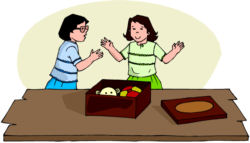by Susie Duffy, M.A.
How does a parent balance the fine line of motivating, helping and supporting their child without becoming overly involved? Further, what is the difference between trying to control your child’s decisions and behaviors versus guiding them and giving them the tools to make their own decisions?
Most people are familiar with the term codependent, but can a parent be codependent? A codependent person may be described as one who allows another persons behavior to affect him/her and whose focus is being overly involved, controlling or attempting to alter that persons behavior.
An example of an overly involved parent may be a parent who has made a college choice for their child. The child however, has made a different college choice and wants to pursue a different course of study. If the parent becomes angry, defensive, or overly involved in their child’s desire to choose a different alternative, the parent may be exhibiting codependent behavior. In addition, the parent has shifted his focus from helping and guiding to wanting to control. It is important for parents to care about their child’s future, education and successes, but there is a balance between guiding and controlling.
The following are guidelines to help children make their own decisions:
• Behavior – parents will often yell or nag instead of allowing their child to reap the natural consequence of their behavior. If a parent chooses to parent with love and limits, warmth and consequences, their child tends to become confident, with a sense of control over their lives.
• Relinquish control – learn to recognize and deal with feelings of trying to control versus helping and guiding. It is important to know yourself as a separate individual, knowing that you exist apart from someone else and you are in control of you.
• Owning your thoughts – it is easy to accept others opinions, never questioning their thought processes and accepting their thoughts as your own. A good guideline is listening to your own thoughts and using others thoughts/beliefs as a resource to your own thinking.
• Trust – trust yourself, your decisions and feelings. Allow children to make choices, experience the natural consequences and help them learn to trust themselves.
We have all experienced the frustrations and disappointments of our children making different choices from the ones that we may have chosen for them. Experiencing these emotions is natural. A problem may occur when a parent becomes overly involved with the child and takes on the responsibility of the child’s choices as their own.
How you approach parenting and setting limits will have an enormous impact on the character of your child. Setting limits and providing guidance will influence children on how they develop values, how well they may do in school, their friends and may even influence their careers.
We welcome your comments or suggestions.
Copyright 2002 Aspen Education Group
Aspen Education Group (AEG) is an organization that is committed to improving the quality of life for youth and their families. Headquartered in Cerritos, California. Aspen operates forty-eight (48) programs in twelve (12) states. Aspen has been providing innovative quality educational programs that promote academic and personal growth for over two decades.
For more information, visit our site: http://www.aspeneducation.com
Aspen Education Group: Help for Today, Hope for Tomorrow.








